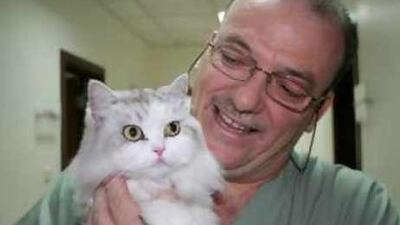RIYADH // The head of Riyadh's religious police recently complained to city fathers that the "phenomenon" of dog-walking was "becoming more and more acceptable". Not only that, added Othman al Othman, it is "being taken advantage of by some young men in a way that conflicts with the rules and regulations of Islam". The young men, it seems, were "using cats and dogs to make passes at women and pester families", Mr Othman told Al Hayat newspaper.
Prince Sattam bin Abdul Aziz, acting governor of Riyadh province, responded by ordering city officials to begin enforcing a 1994 religious edict banning the sale of dogs and cats because the Prophet Mohammed had encouraged Muslims to refrain from trading in the animals, according to an officially circulated memo. Although the ban does not prohibit walking your dog or owning a pet, Mr Othman told Al Hayat that "if a man is caught with a pet, the pet will be immediately confiscated. And the man will be forced to sign a document pledging not to repeat the act."
News of the no-pets-in-public ban circled the globe faster than a speeding panther, provoking mirth and eye-rolling at the latest effort by the Saudi religious police - officially known as the Commission to Promote Virtue and Prevent Vice - to control the lives of ordinary people. For days after, the ban was mocked in newspapers and blogs from Australia to Scotland. Dr Maged Elhayek, a Saudi-born veterinarian, said he took a "panicky" call from a US army vet asking if foreigners would still be allowed to take their pets out of the country.
Dr Elhayek said the religious edict goes beyond what the Prophet said. "First of all, he only discouraged people from selling dogs, he didn't prohibit it." And there was no mention of cats in that advice. The religious police "are trying to stop people from buying cats and dogs so they wouldn't act like a westernised nation", said Dr Elhayek. "I don't know what they're really after. You cannot stop people from being opened up to the world."
At the Life and Nature pet store, the ban was met mostly with derision. "What kind of logic is this?" asked Abdulaziz A al Bahassan, a teenager, cradling his cat Dallah in his arms. "What about little kids who like cats and dogs? They're not going to use them to flirt with girls, so why are they barring these people from buying?" "I'm prettier than the dog, if I want to flirt with women, I'd just use myself!" said Mohammed al Anezi, 21. "I wouldn't need the dog.
"There should be nothing wrong with buying a cat or dog. It should be normal." Abdelaziz al Yousef, 21, who has a German shepherd named Rocky, predicted the ban would be "a big failure". Upstairs in the store, Rabah al Shuwaier, a university student who was veiled in black except for her eyes, had taken two of her six kittens to the vet. "I know that having a pet at home and taking care of it is permissible under Islamic law," Ms Shuwaier said. "But I'm not sure about the ruling on selling and buying cats and dogs. They wouldn't say it's wrong unless they had a reason to."
Salesmen at the pet shop said they had received no official notification of the ban. The commission did not respond to emailed questions about its dog-walking concerns. And more than a week after Al Hayat disclosed the ban, no Saudi official had come forward to clarify that the written version does not include dog-walking, or to explain how people can now acquire dogs and cats. The officials' absence is partly explained by the grand bargain that the ruling royal family has with the Saudi religious community: in exchange for the clerics' support, the royal family allows them a free hand in many areas, particularly ones deemed minor in the larger scheme of things.
Meanwhile, the ruling family retains its prerogative to implement changes in more important issues. King Abdullah bin Abdul Aziz, for example, has taken important initiatives in interfaith dialogue and women entering the workforce despite clerical opposition. Arab culture has generally considered dogs unclean, and Saudi religious authorities have advised against having them as household pets. But dogs are increasingly seen as attractive pets and Saudis, especially the well-off, are keeping household animals of all kinds, said Dr Elhayek, the administrator of Riyadh's Advanced Pet Clinic. Ten years ago, the majority of his clients were western pet-owners. "Now it's almost 50-50," he said, with Arabs accounting for half.
Dr Elhayek noted that the Quran has a story about a group of believers who slept in a cave for 300 years with their dog. In addition, revered stories about the Prophet Mohammed tell of him commending people who saved the lives of dogs by quenching their thirst. "Now don't come and tell me that dogs are a yucky creature," Dr Elhayek said. "They're a beautiful creature and the more I know people, the more I love my dog."
Cats have always been popular pets among Arabs, who as children learn about the Prophet Mohammed's companion, Abu Huraira, or "Father of the Kitten", so-called because he always carried one around. Dr Elhayek said his understanding of the government's order contains no prohibition on walking dogs in public, which is rare anyway in the capital, which has few parks and green spaces. "Everybody who lives in Riyadh ? should not be afraid of walking their dogs out in the streets because nobody's going to do anything to them," Dr Elhayek said. "It's not illegal, its not against the law."
@Email:cmurphy@thenational.ae

